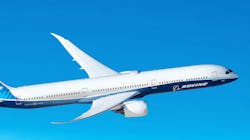Boeing Takes $3.5B Charge on 787 Project
The leaders of Boeing have taken a $3.5 billion charge and booked another $1 billion in “abnormal costs” related to the company’s 787 Dreamliner program, which has been hampered by manufacturing problems and which the Chicago-based company stopped delivering last spring.
Speaking to analysts and investors Jan. 26, on the heels of reporting Boeing’s fourth-quarter results, President and CEO David Calhoun and CFO Brian West said they are continuing to talk to Federal Aviation Administration regulators about what will be required of them to be able to resume 787 deliveries. In the meantime, they added, the company is manufacturing the planes at a “very low” rate with an eye to growing production to a rate of five per month.
Calhoun and West did not provide a possible timeline for when they expect to get FAA clearance but, asked about some airlines’ recent comments that it could be April, Calhoun said customers “know exactly what’s going on and where it is. I don’t want to get ahead of anybody […] That’s up to the FAA, and we’re going to let them do what they have to do.”
Calhoun and West three months ago told investors the 787 project’s difficulties and delays would cost Boeing an extra $1 billion. In saying that number has now doubled, they said Jan. 26 that those costs – most will be incurred by the end of next year – cover extra work on door surrounds and compensatory payments they’re having to send to customers. For all of 2021, Boeing delivered just 14 787s versus 53 in the year before. (In all, the company delivered 99 planes in the last three months of 2021, up from 59 in late 2020, with 737s making up 85% of all deliveries.)
Weighed down by the $3.5 billion pre-tax, non-cash charge as well as a $402 million charge on a military tanker program, Boeing reported a fourth-quarter net loss of $4.1 billion on sales of $14.8 billion. For the year, the company lost $4.2 billion on sales of $62.3 billion. Shares of the company (Ticker: BA) were down more than 3% in midday trading Jan. 26. They have lost more than 10% of their value in the past six months.
As evidenced by the delivery numbers, the 737 was a bright spot for Boeing late last year and it should continue to be: West said the company hopes to resume deliveries of the 737 Max—which also ran into quality problems in recent years—to Chinese customers this quarter. Boeing is now producing 27 737s per month and, absent significant Omicron disruptions, expects to soon grow that number to 31.
More broadly, Calhoun said bookings momentum and client and prospect discussions about longer-term plans are “still quite robust” and that Boeing is confident in its business outlook beyond the next few quarters.
“We remain focused on solidifying our business for long-term success. The lessons we’ve learned and the changes we’ve implemented in the last two years will help us to do that,” West said on the earnings call. “We’re driving safety, quality, stability into every corner of our operations to enable future growth. And we made solid progress against our goals over the last three months.”
About the Author
Geert De Lombaerde
Senior Editor
A native of Belgium, Geert De Lombaerde has been in business journalism since the mid-1990s and writes about public companies, markets and economic trends for Endeavor Business Media publications, focusing on IndustryWeek, FleetOwner, Oil & Gas Journal, T&D World and Healthcare Innovation. He also curates the twice-monthly Market Moves Strategy newsletter that showcases Endeavor stories on strategy, leadership and investment and contributes to other Market Moves newsletters.
With a degree in journalism from the University of Missouri, he began his reporting career at the Business Courier in Cincinnati in 1997, initially covering retail and the courts before shifting to banking, insurance and investing. He later was managing editor and editor of the Nashville Business Journal before being named editor of the Nashville Post in early 2008. He led a team that helped grow the Post's online traffic more than fivefold before joining Endeavor in September 2021.
